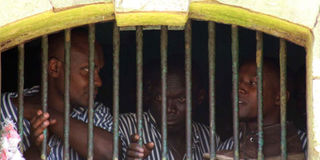Avoid unnecessary imprisonment

Convicts look through the grilled windows inside Nairobi Remand Prison Industrial Area, Monday, January 22, 2018. PHOTO | DENNIS ONSONGO | NATION MEDIA GROUP
What you need to know:
- Congestion heightens the spread of diseases, and the rates of tuberculosis and HIV in prison are double those of the free population.
Multiple barriers prevent most detainees from obtaining justice.
- Families of inmates lose income, forfeit education opportunities and incur generational disadvantages as a result of pretrial detention.
Inmates at Nairobi Remand and Allocation Maximum Security Prison in the Industrial Area staged a hunger strike last month to protest poor living conditions.
Coincidentally, a day later, men and women prisoners in more than 17 detention facilities in the United States began a strike to advocate against “modern-day slavery” in the facilities.
In Kenya, thousands of prisoners languish in overcrowded jails, where the capacity is above 200 per cent, based on the latest data from World Prison Brief.
Of the incarcerated, some 40 per cent — roughly 23,000 people — stay in custody for nearly 2.5 years before their trials begin.
Congestion heightens the spread of diseases, and the rates of tuberculosis and HIV in prison are double those of the free population. The consequences of incarceration also manifest beyond the time in prison. Former inmates are highly likely to encounter difficulties in looking for employment and reintegrating into society.
UNJUST VERDICTS
The root cause of the problem is that many detainees in Kenya should not even be in prison in the first place. The majority simply lack the means to defend themselves in court, resulting in unjust verdicts that could have been challenged and overturned.
Multiple barriers prevent most detainees from obtaining justice. About 90 per cent of them cannot afford quality legal representation.
Besides, finding a lawyer in Kenya is a challenge. According to a University of Pennsylvania report, one lawyer serves 5,686 people in Kenya. Even when they access legal service, they only see their lawyer once — often on the day of the trial.
Without access to quality legal services, defendants are unable to present an adequate defence in court and judges lack sufficient information to deliver a balanced verdict.
SOCIOECONIMIC DEVELOPMENT
The challenges in legal representation and a backlog of cases leads to unnecessary imprisonment for long periods, denying thousands of people the opportunity to be productive members of society and a good quality life.
Pre-trial detention undermines socioeconomic development, especially in poorer communities that are least able to handle the impact. Each incarcerated income earner supports an average of six other individuals; and 165,000 people are affected daily.
Families of inmates lose income, forfeit education opportunities and incur generational disadvantages as a result of pretrial detention. Women and children, in particular, are significantly affected. Women in prison can no longer care for their families, either through domestic work or outside employment. Young children are detained with their mothers, left with relatives or forced out of their homes.
QUIT JOBS
Detainees’ spouses must often either quit jobs to care for the family or leave home to work for lost income. Children are less likely to attend school and more likely to engage in crime.
These challenges are just but an example of what unnecessary pretrial causes.
Kenya should shift from a punitive society to a reconciliatory one and a robust awareness on Alternative Dispute Resolution, anchored on Article 159 of the Constitution, embraced.
The public should be aware of alternatives to litigation in cases that allow and are not repugnant to justice or contravene the Bill of Rights. Alternative methods such as mediation, negotiation, arbitration and traditional dispute mechanism should be promoted.
Secondly, the plea bargaining concept, as provided for by the Criminal Procedure Code, should be promoted. Either the prosecution and defence can initiate plea agreement negotiation in instances that the law allows, especially where there are no victims.
FAVOURABLE BAIL
Lastly, judges and magistrates ought to give favourable bail and bond terms. Bail and bond are constitutional rights under Article 49(1) (h).
At times, bail and bond terms are equated to the gravity of the offence without considering the accused person’s ability to raise the cash or surety. This defeats the constitutional spirit of the rights to an arrested person and the concept of fair trial.
Notably, accused persons who are out on bail or bond are likely to get acquitted as they can prepare for their cases adequately.
Inmates, whether remanded or convicted, are kept in prison at the taxpayer’s cost. It costs Sh210 a day to keep a person behind bars.
With more than 54,000 prisoners, you can do the math! Add to that the fact that the productivity of the prisoners is impeded.
Mr Muthuri is a legal aid manager at African Prisons Project. [email protected]




